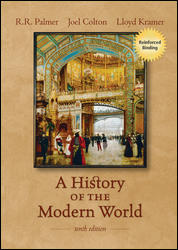
History of the Modern World, 10th Edition (Palmer)Chapter 21: The Second World WarChapter OverviewDissatisfaction with the settlement of World War I led to renewed conflict in 1939. Nazi and fascist aggression initially met with apathy, but the fall of France mobilized Britain and later the U.S., along with other allies, in a struggle against the forces of totalitarianism. The war spread outside the boundaries of Europe to include colonized areas in Asia and Africa as Japan joined the Axis powers. The conflict took on global proportions and paved the way for the strengthening of anti-colonial forces after the war. The scale of destruction rivaled World War I, but the Nazi’s “final solution” and the use of the atomic bomb set this conflict apart by the end of the war. The resolution of the war divided Germany and laid the foundations for the growing tensions between the U.S. and the Soviet Union. The Nuremberg trials and the founding of the U.N. symbolized a renewed effort at international cooperation. |  |















